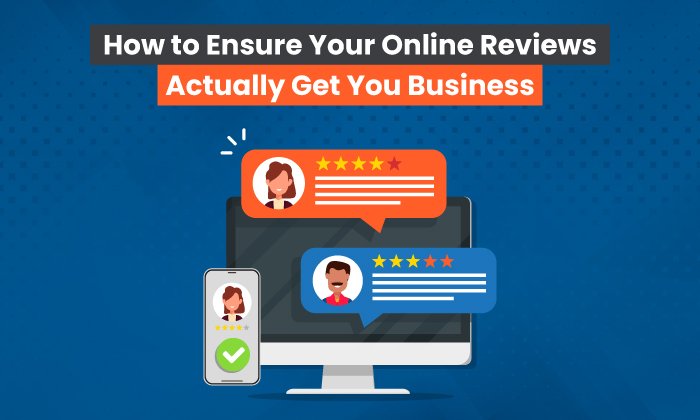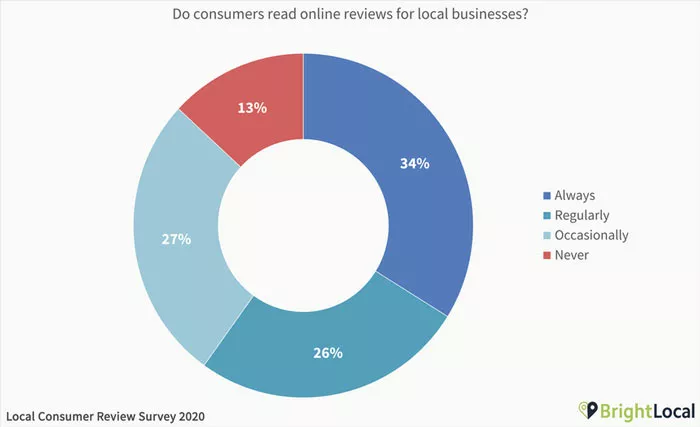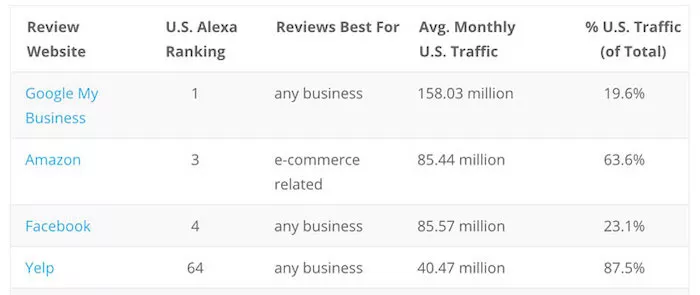
Every successful business relies on reviews.
In the past, it was word-of-mouth recommendations from friends or family.
If you wanted to go to the movies on the weekend, you’d pick up the local newspaper and read what film critics had to say.
In today’s digital world, it’s online reviews that people turn to when needing advice on purchasing decisions. By focusing your marketing efforts on acquiring more of the right reviews, you can grow your business without funneling more money toward expenses like paid ads.
The big question is, how do you improve your online reviews or even get people to leave reviews that lead to more sales in the first place?
Below, you’ll find everything you need to whip your online reputation into shape, from which review platforms to focus on to how to ask for reviews that’ll actually make a difference to your bottom line.
Why Are Good Online Reviews Important?
Online reviews play a crucial part in the success of your business. Eight-seven percent of consumers read online reviews to decide what to buy, where to stay, and which restaurant to visit.

If you’re neglecting your reviews, you’re operating with a major hindrance.
Here’s why:
- Reviews influence search engine rankings: According to a Moz study, review signals make up around 15 percent of ranking factors. The more good reviews you have, the higher up your business will appear on local search results.
- Social proof influences purchases and fosters trust: If someone else has had a good experience with a brand, we feel more confident in giving them our money. So much so that 78 percent of consumers say positive reviews make them trust a business more.
- Reviews help with decision making: If you’re unsure which product to buy from two different brands, online reviews can help take the anxiety out of making the wrong decision.
4 Top Sites for Online Reviews
You need to aim for reviews on the review sites that are going to convert. These sites should be well-known and make it easy to leave reviews.
So, where do the most influential reviews occur?
In most cases, the big four are Google, Amazon, Facebook, and Yelp.

As you can see, these sites have a combined average of just shy of 370 million visitors each month.
They’re also suitable for any business (except for Amazon), which makes them one of the digital lifelines of many local businesses.
1. Google My Business
If you’ve ever searched something like:
“Restaurants in New York” or “hairdressers near me,” you’ve seen this pop up in the results.

Google uses distance and location ranking to deliver optimized search results. It helps users find the best and nearest solution and shows rankings and reviews to help make a decision.
In other words, getting your business’s website optimized for local search is one of the best ways to get more customers without any aggressive marketing campaigns.
How do you get onto Google My Business?
You need to create and verify your Business profile. Once it’s set up, you can control how your business shows up in search, including contact details, opening hours, etc. You’ll start appearing in Google’s listings for your business category.
Next, you want to work on getting reviews. The more 5-star reviews you have, the higher your business will appear on the Google My Business search results.
Bonus: I have an in-depth guide on further optimizing your Google My Business to increase your sales (including how to avoid the No. 1 mistake businesses make).
2. Amazon
Amazon was one of the first online retailers to allow reviews. Starting in 1995, it’s become one of the most important places for consumers to validate a purchasing decision.
Imagine you wanted to buy a smartphone tripod, and there are two brands on Amazon. One has multiple one-star ratings, while the other has an average of 4-stars.
Which one would you pick?
You’d most likely pick the latter because you feel more secure in the value of the product.
You’re not alone.
A study from Bazaarvoice found 39 percent of U.S. shoppers relied on reviews the most when online shopping to make an informed decision faster.
If you sell products on Amazon, you need to focus on getting reviews. Not only will it help consumers trust your brand, but it will boost your search results rankings with Amazon’s A9 algorithm. The higher you appear on search, the more visibility you have, and the more sales you’ll make.
3. Yelp
Failing to be on Yelp means you won’t be successful, especially if you’re a locally-based business.
If you want proof of Yelp’s success with local businesses, look no further than the laundry list of Case Studies on their website.
Yelp does require a little more of a hands-on approach than Facebook, though.
That’s because it weighs some reviews above others. Yelp is unique as it always tries to display the reviews that it deems “most helpful.”
While you may disagree that a one or two-star review could be helpful, Yelp has a fair process in place.
They weigh:
- The overall history of the reviewer.
- The feedback left on each review (e.g., a like on a review)
- The quality of the reviews you already have to determine how to incorporate each new review.
How does this work for you?
The simple answer is you need to get as many high-quality reviews as possible. Doing so will bring all of those well-reviewed benefits we discussed earlier.
While you can’t directly ask for reviews on Yelp, as that breaks their terms of service agreement, you can ask people to “check you out on Yelp.” Any format of that works just so long as you don’t ask for a review.
Your best bet for positioning on Yelp is actually just personal pushing.
Set up your Yelp profile, claim your business, and display the sticker they send you in a prominent location.
Then, when you’re interacting with customers and receive positive feedback, direct them toward Yelp.
You can even include the Yelp badge on your website or email signature. It will encourage new visitors to check out your reviews and possibly even remind them to review you themselves.
4. Facebook
Facebook is another platform that works for almost every type of business.
Whether you’re offering a service or a physical product, you can leverage the power of Facebook Reviews.
To get more reviews, all you need to do is set up a Review Tab on your business page, make sure it’s easy to find, and you’re good to go.
Here’s how to do it:
Go to your Page’s Settings tab, scroll down to the Edit Page section to where it says “Reviews,” and turn them on.

Not all Facebook’s Pages display reviews, so you’ll need to look at your Template options.
Just above where you turned on your reviews, you’ll see an option to select your Template.
Look through the options to find one that suits the type of business you have. Or, just opt to go with the default “Business” version.

When you’ve picked a template, scroll down to make sure reviews are supported.
You’re now set up to receive and display reviews on Facebook.
How to Get High Quality Online Reviews
Now that you’re everywhere you need to be to get reviews, let’s look at a few techniques you can start implementing to win high-quality social proof quickly.
Incentivize Online Reviews
People love free stuff. Getting something for virtually nothing feels like a reward. You can tap into this emotion by incentivizing your audience to leave you a review.
Offer a discount code on a future purchase, Amazon gift card, or cold, hard cash. Not only will it boost your brand’s positive reviews, but it inspires customer loyalty.
Monitor All Review Platforms
You want to stay on top of your online reviews. It will help you find your raving fans and disgruntled customers before things escalate and damage your reputation.
You can manually monitor your reviews or invest in software like Podium or Birdeye.
Both platforms monitor conversations around your brand and send you instant, daily, or weekly email updates about what your customers are saying about you.
Quickly and Politely Address Negative Feedback
Businesses screw up. It happens to everyone, but how you handle it will define your brand.
Don’t ignore bad online reviews. Respond as quickly as possible and focus on solving the problem.
Approach each case Disney’s H.E.A.R.D. Technique:
- Hear: Let the customer tell you the story and genuinely listen to what they have to say.
- Empathize: Show the customer you understand why they are upset. You can use phrases like “I understand why you’re frustrated. I would feel like that, too.”
- Apologize: Give a sincere apology. No business wants its customers to feel upset.
- Resolve: Do your best to resolve the problem as quickly as possible. If you’re not sure what’s the best solution, ask the customer what you need to do to make the situation right.
- Diagnose: Figure out what caused the problem and fix it, so the issue doesn’t happen again.
By using the H.E.A.R.D. approach, you can potentially save the relationship and prevent losing the customer for good.
With the cost of acquiring a new customer seven times more than retaining one, it’s in your best interest financially to address negative reviews as quickly as possible.
Ask the Right Customers to Review Their Experience
You don’t need every single customer reviewing your product or service.
You want your top fans. The people who love your products have had incredible results with your business and are getting real value from your service. These customers write powerful reviews that can sway someone on the fence to sign up for your latest offer.
Here’s how to identify the right customers for reviews:
- Referrers: If someone is sending people to your business, then they’ve experienced success with your product or service.
- High customer feedback scores: If clients rate their experience with you a 9/10 or a 10/10, those are the people you want to write reviews.
- Engagement: If a customer is engaged with your offer, it means they’re happy. Who is using your product the most? Who is a repeat customer?
Spotlight High Quality Reviews
Don’t let your best reviews collect dust in your inbox or on Yelp. Put them to work!
You can use reviews as testimonials and add them to your:
- sales pages
- homepage
You can go one step further and highlight reviews by sharing them on your:
- social media (e.g., create an Instagram Stories highlight)
- newsletter
For stellar reviews, you can turn a customer’s success into an in-depth case study. Case studies are valuable pieces of content that can help your sales team sell your offering and demonstrate to clients how your service or product can change their lives.
Ask at the Right Time
One of the biggest faux pas you can make is asking for an online review at the wrong time.
For example, if you ask customers weeks or months after their last interaction with you, you’ll get a lackluster response (if you get one at all).
The reason? The client has to dig up memories long after it’s happened.
Your best reviews come from clients when the experience is fresh in their minds. It will make it easy for them to write a review and recall all the details of what made the experience special.
Here’s when it’s usually a good time to ask for a review:
- Your customer hits a milestone (e.g., subscribed to your service for 12 months).
- A day or two after your product is delivered.
- After having a positive interaction with your team.
- Before leaving an event you have hosted.
Online Reviews: FAQs
The best and most popular review sites are Google My Business, Amazon, Facebook, and Yelp. However, you should investigate review sites within your niche. E.g., authors should focus on GoodReads for book reviews, and companies should look at Glassdoor for employee reviews.
Online reviews are critical because it impacts your company’s reputation and bottom line. It’s also a Google ranking factor, meaning reviews can boost your business up the search engine results and increase site traffic.
If you have too many bad reviews, it can influence people not to buy your products and services. Similarly, good reviews foster trust, help consumers feel confident in their purchasing decisions, and increase sales.
According to a BrightLocal study, 87 percent of consumers read online reviews.
Online Reviews: Conclusion
Online reviews are a vital method of winning new business in every industry. They’re seen by almost everyone and play heavily into your success both offline and online.
Prioritize your customer’s reviews on platforms like Facebook, Yelp, Amazon, and Google. Then be active in your approach to winning more positive and negative reviews.
Successful reviews may not happen overnight. Think of it like any other process in your business. It takes work, but it sure feels good when you finally get there and start seeing the customers roll in from it.
What hacks do you use to get positive online reviews for your business?